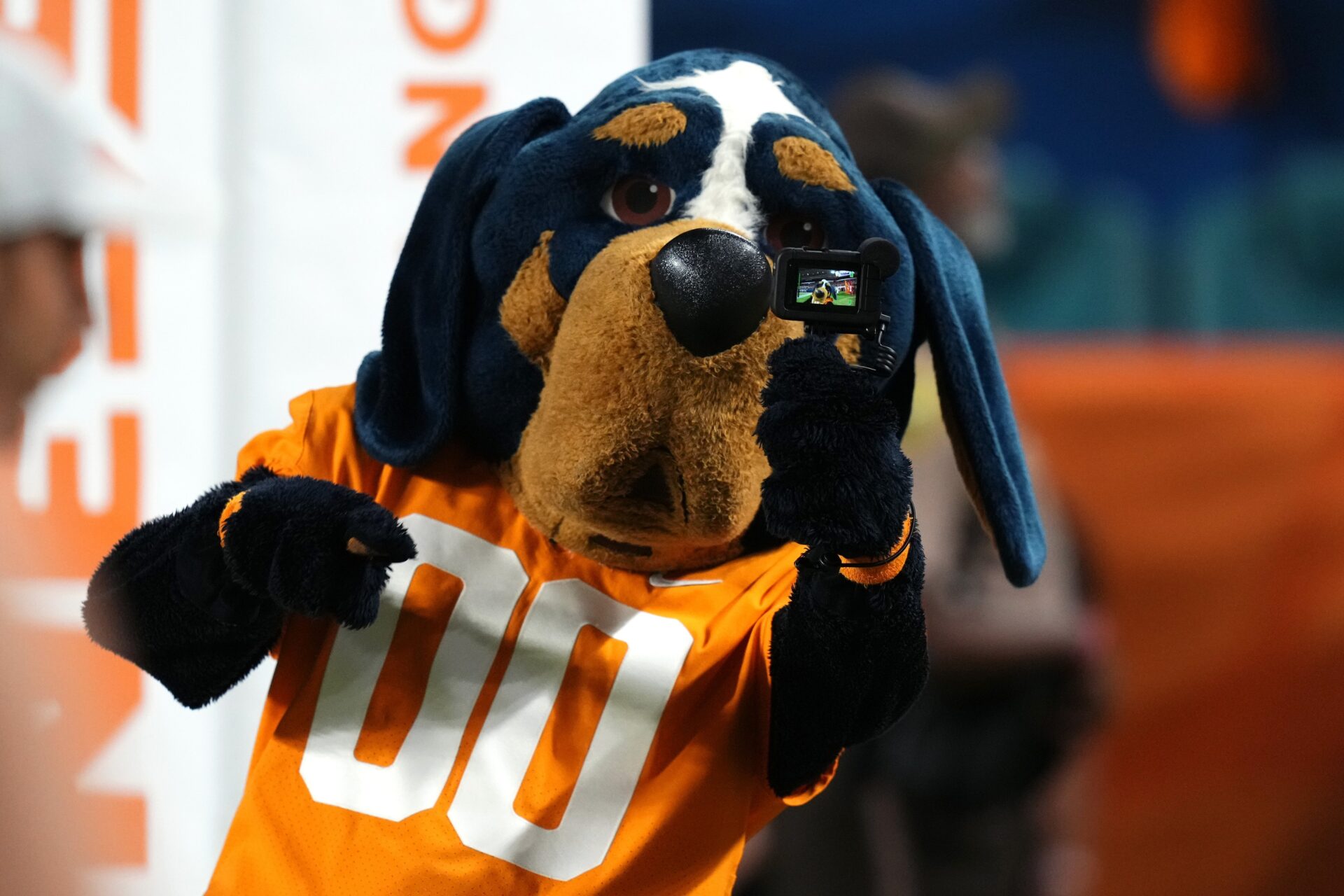Forget Texas. Is Tennessee the program in orange that is officially back? With their best record and AP Poll ranking since 2001, the Vols are officially relevant in college football once more. As they’re set to be a prominent feature on fall Saturdays this year, let’s take a look at the history of the Tennessee Volunteers mascot!

What Is the Tennessee Volunteers Mascot?
The Volunteers’ mascot is a dog named Smokey. The live-action mascot, a breed called the Bluetick Coonhound, has been a part of Tennessee tradition since 1953 when a contest was held between multiple dogs during the halftime of the Mississippi State game following local newspaper advertisements.
The original Volunteers mascot, “Blue Smokey,” was selected after the type of crowd interaction that has become commonplace between fans and their program’s mascot. It is reported that when his name was announced over the tannoy, he barked in recognition.
When the crowd roared, he let out another loud howl and endeared himself to the Tennessee fans. Sadly, the original Smokey presided over the worst record of any of the live dog Volunteers mascots that followed and met an untimely death in 1954 with a 10-10-1 record.
There have been several iterations of the Volunteers mascot since, all keeping the “Smokey” name. The 2022 college football campaign that saw Tennessee post an 11-2 record, win the Orange Bowl, and overwhelm rival Alabama, was the last one for Smokey X, who retired on a high note. He was the first hound not to descend from the original bloodline.
MORE: ACC QB Rankings 2023 — Ranking the Projected Starting QBs for 2023
For the 2023 college football season, Smokey XI will assume the volunteer mascot role. Below is a full list of the Tennessee mascots and their period of reign for the Volunteers.
- Blue Smokey, 1953-1954
- Smokey II, 1955-1963
- Smokey III, 1964-1977
- Smokey IV, 1978-1979
- Smokey V, 1980-1983
- Smokey VI, 1984-1991
- Smokey VII, 1992-1994
- Smokey VIII, 1995-2003
- Smokey IX, 2004-2012
- Smokey X, 2013-2022
- Smokey XI, 2023
Since the early 1980s, Smokey has been joined on the sidelines by a costumed version that goes by the same name. After several unpopular designs, the current costume — complete with a “00” Tennessee jersey — has been in place since 1988.
Amongst his many escapades at athletics events for the university, the costumed Volunteers mascot has appeared in multiple commercials, was a quarterfinalist at the 2006 Capital One Mascot Challenge, and was inducted into the Mascot Hall of Fame in 2008.
Why Is the Tennessee Volunteers Mascot a Dog?
The Volunteers mascot has been a dog since 1953. The decision to choose a dog was made by the University of Tennessee Prep Club, which chose a coonhound as it was a common breed in the state.
Prior to 1953, many joked that the university was “all bark and no bite.” A dog mascot soon changed that, and while they have had some toothless offenses in recent years, there is certainly a dangerous bite in their game ahead of the 2023 season.
Why Are They Called the Tennessee Volunteers?
Since 1812, Tennessee has been known as the Volunteer state. The name originated from the willingness of the state’s men to volunteer to go into battle with the British at the Battle of New Orleans.
That resolve was repeatedly evidenced. In 1835, during the war of Texas Independence, the volunteers of Tennessee were on hand to help the Texans stave off the Mexican Army. During the Mexican American War of 1848, it was reported that 30,000 Tennessee natives answered a call for 2,600 volunteers.
MORE: History of the Iowa State Cyclones Mascot
The University of Tennessee adopted the state name for its athletics programs in 1905 despite the first recorded instance of them being referred to as the “Tennessee Volunteers” in 1902.
The adoption of the state name, a name forged in military pride and passion, creates an ever-lasting sense of pride and commonality that epitomizes the traditions of college football.

